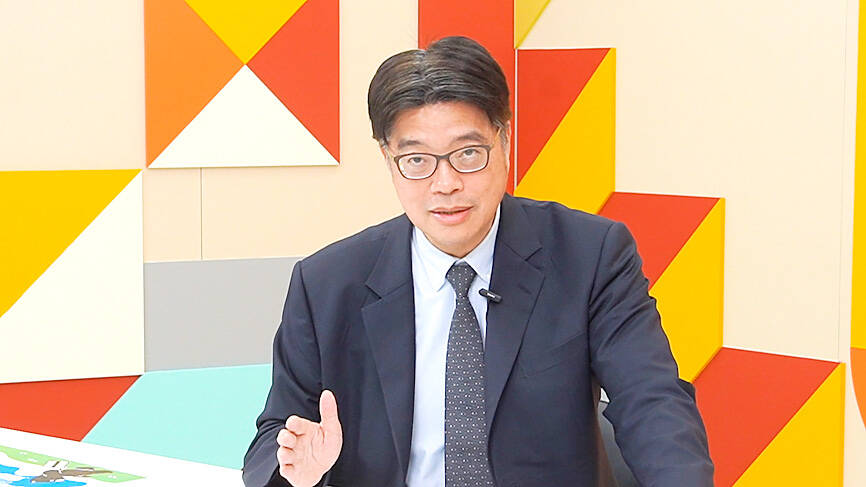Taiwan’s future cannot be contingent on the goodwill of Beijing, Mainland Affairs Council Minister Chiu Chui-cheng (邱垂正) said in an interview published yesterday by the Chinese-language Liberty Times (sister paper of the Taipei Times), while adding that the government would seek dialogue over confrontation.
The People’s Republic of China has since its founding refused to accept the fact that the Republic of China exists, and has resorted to various forms of threats to coerce Taiwan into accepting its “one China” principle, he said.
Taiwanese find China’s political preconditions for dialogue unacceptable, he said.

Photo: Huang Chun-hsuan, Taipei Times
“We do not accept narrow-minded and rigid ideological frameworks,” Chiu added.
Beijing’s military and economic threats, diplomatic oppression and other actions, including infiltration of Taiwanese society and the use of cognitive warfare, have caused the two sides of the Taiwan Strait to drift further away from each other, he said.
Such actions go against Chinese leaders’ comments that Taiwan and China should be spiritually intertwined, he added.
Chinese oppression of Taiwan is why it has become the target of an international “containment” policy, Chiu said, calling on Beijing to consider measures to facilitate a cross-strait thaw.
The nation’s future should not be contingent upon the “goodwill” of Chinese leaders, he said, adding that President William Lai’s (賴清德) four “pillars” of peace are key to realizing that goal.
In an op-ed in the Wall Street Journal in July last year, Lai defined the four pillars as building up the nation’s defense capabilities, promoting economic security and fostering supply chain resilience, forming partnerships with other democracies and maintaining steady and principled cross-strait leadership.
Commenting on Beijing’s recent guidelines allowing its courts to impose severe punishments on “die-hard Taiwanese independence advocates,” Chiu said they have a negative effect and undermine cross -strait relations.
They are a classic demonstration of “legal warfare,” he said, urging Taiwanese to reconsider non-essential visits to China, Macau or Hong Kong.
The guidelines are full of “uncivilized” practices, including long-arm jurisdiction, trials in absentia, confiscation of property and even extend to a target’s family, he added.
Chiu also called on Beijing to release the cerw of the fishing boat Da Jin Man No. 88 (大進滿88), which was detained by the China Coast Guard on Tuesday last week, as well as provide medicine for crew members who need them.

The Ministry of Foreign Affairs (MOFA) yesterday voiced dissatisfaction with the Comprehensive and Progressive Agreement for Trans- Pacific Partnership (CPTPP), whose latest meeting, concluded earlier the same day, appeared not to address the country’s application. In a statement, MOFA said the CPTPP commission had "once again failed to fairly process Taiwan’s application," attributing the inaction to the bloc’s "succumbing to political pressure," without elaborating. Taiwan submitted its CPTPP application under the name "Separate Customs Territory of Taiwan, Penghu, Kinmen and Matsu" on Sept. 22, 2021 -- less than a week after China

ALIGNED THINKING: Taiwan and Japan have a mutual interest in trade, culture and engineering, and can work together for stability, Cho Jung-tai said Taiwan and Japan are two like-minded countries willing to work together to form a “safety barrier” in the Indo-Pacific region, Premier Cho Jung-tai (卓榮泰) yesterday said at the opening ceremony of the 35th Taiwan-Japan Modern Engineering and Technology Symposium in Taipei. Taiwan and Japan are close geographically and closer emotionally, he added. Citing the overflowing of a barrier lake in the Mataian River (馬太鞍溪) in September, Cho said the submersible water level sensors given by Japan during the disaster helped Taiwan monitor the lake’s water levels more accurately. Japan also provided a lot of vaccines early in the outbreak of the COVID-19 pandemic,

THE GOOD WORD: More than 100 colleges on both sides of the Pacific will work together to bring students to Taiwan so they can learn Mandarin where it is spoken A total of 102 universities from Taiwan and the US are collaborating in a push to promote Taiwan as the first-choice place to learn Mandarin, with seven Mandarin learning centers stood up in the US to train and support teachers, the Foundation for International Cooperation in Higher Education of Taiwan (FICHET) said. At the annual convention of the American Council on the Teaching of Foreign Languages held over the weekend in New Orleans, Louisiana, a Taiwan Pavilion was jointly run by 17 representative teams from the FICHET, the Overseas Community Affairs Council, the Steering Committee for the Test of Proficiency-Huayu, the

A home-style restaurant opened by a Taiwanese woman in Quezon City in Metro Manila has been featured in the first-ever Michelin Guide honoring exceptional restaurants in the Philippines. The restaurant, Fong Wei Wu (豐味屋), was one of 74 eateries to receive a “Michelin Selected” honor in the guide, while one restaurant received two Michelin stars, eight received one star and 25 were awarded a “Bib Gourmand.” The guide, which was limited to restaurants in Metro Manila and Cebu, was published on Oct. 30. In an interview, Feng Wei Wu’s owner and chef, Linda, said that as a restaurateur in her 60s, receiving an